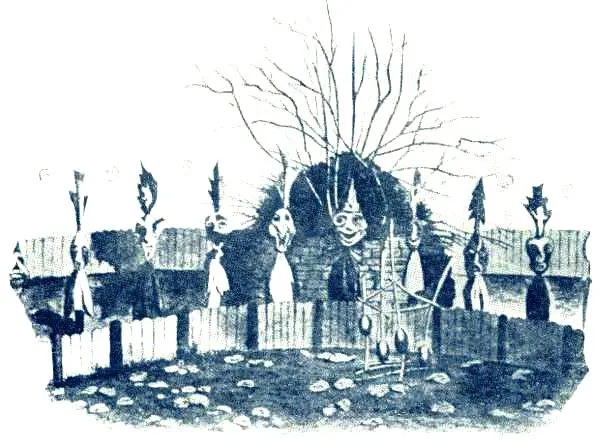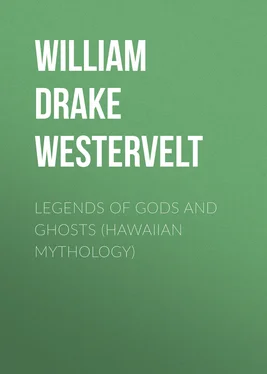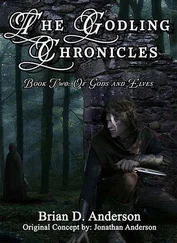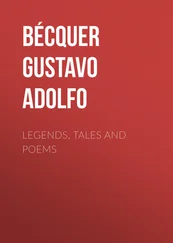William Drake Westervelt - Legends of Gods and Ghosts (Hawaiian Mythology)
Здесь есть возможность читать онлайн «William Drake Westervelt - Legends of Gods and Ghosts (Hawaiian Mythology)» — ознакомительный отрывок электронной книги совершенно бесплатно, а после прочтения отрывка купить полную версию. В некоторых случаях можно слушать аудио, скачать через торрент в формате fb2 и присутствует краткое содержание. Жанр: foreign_antique, Старинная литература, Мифы. Легенды. Эпос, на английском языке. Описание произведения, (предисловие) а так же отзывы посетителей доступны на портале библиотеки ЛибКат.
- Название:Legends of Gods and Ghosts (Hawaiian Mythology)
- Автор:
- Жанр:
- Год:неизвестен
- ISBN:нет данных
- Рейтинг книги:3 / 5. Голосов: 1
-
Избранное:Добавить в избранное
- Отзывы:
-
Ваша оценка:
- 60
- 1
- 2
- 3
- 4
- 5
Legends of Gods and Ghosts (Hawaiian Mythology): краткое содержание, описание и аннотация
Предлагаем к чтению аннотацию, описание, краткое содержание или предисловие (зависит от того, что написал сам автор книги «Legends of Gods and Ghosts (Hawaiian Mythology)»). Если вы не нашли необходимую информацию о книге — напишите в комментариях, мы постараемся отыскать её.
Legends of Gods and Ghosts (Hawaiian Mythology) — читать онлайн ознакомительный отрывок
Ниже представлен текст книги, разбитый по страницам. Система сохранения места последней прочитанной страницы, позволяет с удобством читать онлайн бесплатно книгу «Legends of Gods and Ghosts (Hawaiian Mythology)», без необходимости каждый раз заново искать на чём Вы остановились. Поставьте закладку, и сможете в любой момент перейти на страницу, на которой закончили чтение.
Интервал:
Закладка:
Kahele hastened toward the temple. The Mu was watching his coming and joyfully marking him as a victim. The altars of the gods were desolate, and if but a particle of smoke fell upon the young man no one could keep him from the hands of the executioner.
The perilous moment came. The warm breath of one of the fires touched the young chief's cheek. Soon a blow from the club of the Mu laid him senseless on the rough stones of the outer court of the temple. The smoke of the wrath of the gods had fallen upon him, and it was well that he should lie as a sacrifice upon their altars.
Soon the body with the life still in it was thrown across the sacrificial stone. Sharp knives made from the strong wood of the bamboo let his life-blood flow down the depressions across the face of the stone. Quickly the body was dismembered and offered as a sacrifice.
For some reason the priests, after the flesh had decayed, set apart the bones for some special purpose. The legends imply that the bones were to be treated dishonorably. It may have been that the bones were folded together in the shape known as unihipili, or "grasshopper" bones, i.e. , folded and laid away for purposes of incantation. Such bundles of bones were put through a process of prayers and charms until at last it was thought a new spirit was created which dwelt in that bundle and gave the possessor a peculiar power in deeds of witchcraft.
The spirit of Kahele rebelled against this disposition of all that remained of his body. He wanted to be back in his native district, that he might enjoy the pleasures of the Under-world with his own chosen companions. Restlessly the spirit haunted the dark corners of the temple, watching the priests as they handled his bones.
Helplessly the ghost fumed and fretted against its condition. It did all that a disembodied spirit could do to attract the attention of the priests.
At last the spirit fled by night from this place of torment to the home which he had so joyfully left a short time before.
Kahele's father was the high chief of Kau. Surrounded by retainers, he passed his days in quietness and peace waiting for the return of his son.
One night a strange dream came to him. He heard a voice calling from the mysterious confines of the spirit-land. As he listened, a spirit form stood by his side. The ghost was that of his son Kahele.
By means of the dream the ghost revealed to the father that he had been put to death and that his bones were in great danger of dishonorable treatment.
The father awoke benumbed with fear, realizing that his son was calling upon him for immediate help. At once he left his people and journeyed from place to place secretly, not knowing where or when Kahele had died, but fully sure that the spirit of his vision was that of his son. It was not difficult to trace the young man. He had left his footprints openly all along the way. There was nothing of shame or dishonor—and the father's heart filled with pride as he hastened on.
From time to time, however, he heard the spirit voice calling him to save the bones of the body of his dead son. At last he felt that his journey was nearly done. He had followed the footsteps of Kahele almost entirely around the island, and had come to Puna—the last district before his own land of Kau would welcome his return.
The spirit voice could be heard now in the dream which nightly came to him. Warnings and directions were frequently given.
Then the chief came to the lava fields of Wahaula and lay down to rest. The ghost came to him again in a dream, telling him that great personal danger was near at hand. The chief was a very strong man, excelling in athletic and brave deeds, but in obedience to the spirit voice he rose early in the morning, secured oily nuts from a kukui-tree, beat out the oil, and anointed himself thoroughly.
Walking along carelessly as if to avoid suspicion, he drew near to the lands of the temple Wahaula. Soon a man came out to meet him. This man was an Olohe, a beardless man belonging to a lawless robber clan which infested the district, possibly assisting the man-hunters of the temple in securing victims for the temple altars. This Olohe was very strong and self-confident, and thought he would have but little difficulty in destroying this stranger who journeyed alone through Puna.
Almost all day the battle raged between the two men. Back and forth they forced each other over the lava beds. The chief's well-oiled body was very difficult for the Olohe to grasp. Bruised and bleeding from repeated falls on the rough lava, both of the combatants were becoming very weary. Then the chief made a new attack, forcing the Olohe into a narrow place from which there was no escape, and at last seizing him, breaking his bones, and then killing him.
As the shadows of night rested over the temple and its sacred grave the chief crept closer to the dreaded tabu walls. Concealing himself he waited for the ghost to reveal to him the best plan for action. The ghost came, but was compelled to bid the father wait patiently for a fit time when the secret place in which the bones were hidden could be safely visited.
For several days and nights the chief hid himself near the temple. He secretly uttered the prayers and incantations needed to secure the protection of his family gods.
One night the darkness was very great, and the priests and watchmen of the temple felt sure that no one would attempt to enter the sacred precincts. Deep sleep rested upon all the temple-dwellers.
Then the ghost of Kahele hastened to the place where the father was sleeping and aroused him for the dangerous task before him.
As the father arose he saw this ghost outlined in the darkness, beckoning him to follow. Step by step he felt his way cautiously over the rough path and along the temple walls until he saw the ghost standing near a great rock pointing at a part of the wall.
The father seized a stone which seemed to be the one most directly in the line of the ghost's pointing. To his surprise it very easily was removed from the wall. Back of it was a hollow place in which lay a bundle of folded bones. The ghost urged the chief to take these bones and depart quickly.

IMAGES OF GODS AT THE HEIAU
The father obeyed, and followed the spirit guide until safely away from the temple of the burning wrath of the gods. He carried the bones to Kau and placed them in his own secret family burial cave.
The ghost of Wahaula went down to the spirit world in great joy. Death had come. The life of the young chief had been taken for temple service and yet there had at last been nothing dishonorable connected with the destruction of the body and the passing away of the spirit.
II
This is a story from Manoa Valley, back of Honolulu. In the upper end of the valley, at the foot of the highest mountains on the island Oahu, lived Maluae. He was a farmer, and had chosen this land because rain fell abundantly on the mountains, and the streams brought down fine soil from the decaying forests and disintegrating rocks, fertilizing his plants.
Here he cultivated bananas and taro and sweet potatoes. His bananas grew rapidly by the sides of the brooks, and yielded large bunches of fruit from their tree-like stems; his taro filled small walled-in pools, growing in the water like water-lilies, until the roots were matured, when the plants were pulled up and the roots boiled and prepared for food; his sweet potatoes—a vegetable known among the ancient New Zealanders as ku-maru, and supposed to have come from Hawaii—were planted on the drier uplands.
Thus he had plenty of food continually growing, and ripening from time to time. Whenever he gathered any of his food products he brought a part to his family temple and placed it on an altar before the gods Kane and Kanaloa, then he took the rest to his home for his family to eat.
Читать дальшеИнтервал:
Закладка:
Похожие книги на «Legends of Gods and Ghosts (Hawaiian Mythology)»
Представляем Вашему вниманию похожие книги на «Legends of Gods and Ghosts (Hawaiian Mythology)» списком для выбора. Мы отобрали схожую по названию и смыслу литературу в надежде предоставить читателям больше вариантов отыскать новые, интересные, ещё непрочитанные произведения.
Обсуждение, отзывы о книге «Legends of Gods and Ghosts (Hawaiian Mythology)» и просто собственные мнения читателей. Оставьте ваши комментарии, напишите, что Вы думаете о произведении, его смысле или главных героях. Укажите что конкретно понравилось, а что нет, и почему Вы так считаете.











